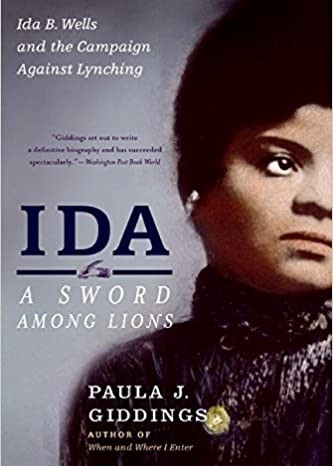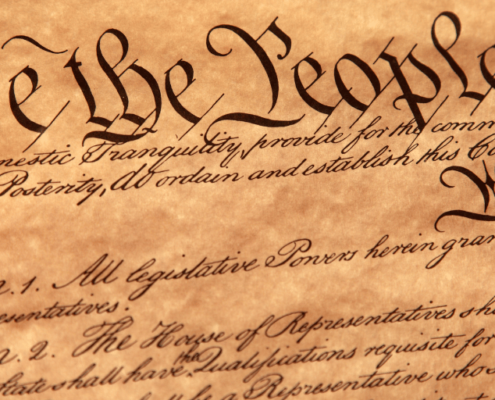Daughters of Liberty: Celebrating the Centennial of Women’s Suffrage & History – 10 Key Resources for K-12 Education
“I long to hear that you have declared an independency. And, by the way, in the new code of laws which I suppose it will be necessary for you to make, I desire you would remember the ladies and be more generous and favorable to them than your ancestors.”
– Abigail Adams to John Adams, March 31, 1776
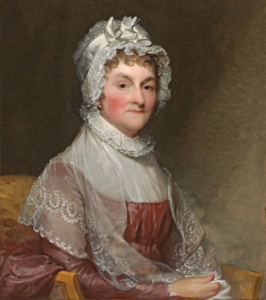
In Pioneer’s ongoing series of blogs here, here, and here on curricular resources for parents, families, and teachers during COVID-19, this one focuses on: Celebrating the Centennial of Women’s Suffrage & Women’s History.
For at least a decade, we’ve worked to highlight great women in American and world history, including the Founding Mothers, Mary Shelly, Harriet Beecher Stowe, Harriet Tubman, Edith Wharton, Marie Curie, Agatha Christie, Zora Neale Hurston, and Fannie Lou Hamer.
In addition to discussing current K-12 education policy matters, our op-eds, event videos, and resources can provide important context for the general public, educators, parents, and students to understand the central role women have played in shaping America and the world.
“Remember the Ladies” event co-keynote, Founding Mothers author, Cokie Roberts
https://www.youtube.com/watch?v=gs_VDNXAlBc
“Remember the Ladies” event co-keynote, Zora Neale Hurston biographer, Valerie Boyd,
https://www.youtube.com/watch?v=pwefI98dqIo
“Remember the Ladies” event panel – Pulitzer-winning biographer of Harriet Beecher Stowe & the biographer of Harriet Tubman & Mary Todd Lincoln
https://www.youtube.com/watch?v=pY3igZ-nbO0&list=PUxPr4y_MBrcdji_ockXjuPA&index=194
“Edith Wharton Not a Core Value” By Jamie Gass
https://www.telegram.com/article/20130124/NEWS/101249883/1020
“Students should know the name Fannie Lou Hamer” By Jamie Gass
“Common Core’s Disturbing, Fiction-Free English Classes Are Straight Outta ‘Frankenstein’” By Jamie Gass https://dailycaller.com/2018/03/07/common-cores-disturbing-fiction-free-english-classes-are-straight-outta-frankenstein/
“Would Marie Curie Have Changed The World If She’d Learned Common Core Math?” By Jamie Gass
https://thefederalist.com/2018/11/30/marie-curie-changed-world-shed-learned-common-core-math/
“Here’s To Agatha Christie, Queen Of The Whodunit” By Jamie Gass
https://thefederalist.com/2015/09/15/heres-to-agatha-christie-queen-of-the-whodunit/
Other resources for parents and their schoolchildren to explore women’s history, include:
- The Who Was? series (ages 8 to 12)
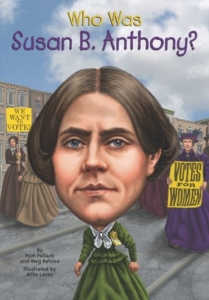 “Susan B. Anthony may be an international icon but her campaign for women’s rights had personal roots. Working as a school teacher in New York, Anthony refused to settle for less pay than her male colleagues which ignited her lifelong devotion to women’s equality. Anthony toured the United States and Europe giving speeches and publishing articles as one of the most important advocates of women’s rights. Learn more about the woman behind the movement in Who Was Susan B. Anthony?” https://www.amazon.com/Who-Was-Susan-B-Anthony/dp/044847963X
“Susan B. Anthony may be an international icon but her campaign for women’s rights had personal roots. Working as a school teacher in New York, Anthony refused to settle for less pay than her male colleagues which ignited her lifelong devotion to women’s equality. Anthony toured the United States and Europe giving speeches and publishing articles as one of the most important advocates of women’s rights. Learn more about the woman behind the movement in Who Was Susan B. Anthony?” https://www.amazon.com/Who-Was-Susan-B-Anthony/dp/044847963X
Other Who Was? series books on prominent women in history:
Who Was Sacagawea?
Who Was Sojourner Truth?
Who Was Harriet Tubman?
Who Was Harriet Beecher Stowe?
Who Was Clara Barton?
Who Was Helen Keller?
Who Was Marie Curie?
Who Was Amelia Earhart?
Who Was Anne Frank?
Who Was Rosa Parks?
Who Was Coretta Scott King?
Who Was Mother Teresa?
2. Founding Mothers: Remembering the Ladies, By Cokie Roberts (ages 6-8)
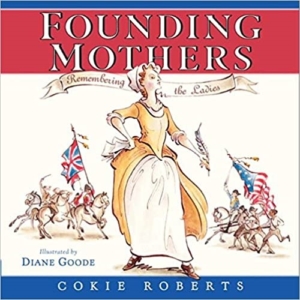 “#1New York Timesbestselling author and celebrated journalist Cokie Roberts brings young readers a stunning nonfiction picture book that highlights the female patriots of the American Revolution. This nonfiction picture book is an excellent choice to share during homeschooling, in particular for children ages 4 to 6. It’s a fun way to learn to read and as a supplement for activity books for children.”
“#1New York Timesbestselling author and celebrated journalist Cokie Roberts brings young readers a stunning nonfiction picture book that highlights the female patriots of the American Revolution. This nonfiction picture book is an excellent choice to share during homeschooling, in particular for children ages 4 to 6. It’s a fun way to learn to read and as a supplement for activity books for children.”
3. Mary Lyon: Documents and Writings (high school to adults)
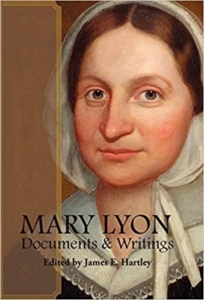 “Before the 19th Amendment to the U.S. Constitution and the Seneca Falls Declaration; before Susan B. Anthony, Elizabeth Cady Stanton, Lucy Stone, Julia Ward Howe, Carrie Chapman and Alice Paul; before John Stuart Mill’s “The Subjection of Women” and Virgina Woolf’s “A Room of One’s Own”; before all these came Mary Lyon. In 1837, by virtue of dogged determination and never removing her sight from her goal, Mary Lyon founded Mount Holyoke Female Seminary, the world’s oldest continuing college for women. Never seeking to draw attention to herself, she steadfastly fought to ensure that the school would outlive her and never become known as “Miss Lyon’s School.” Perhaps as a result, Mary Lyon has not drawn nearly the attention she de- serves in histories of America, the women’s movement or higher education. This volume, for the first time, draws together the major documents and writings of Mary Lyon’s remarkable career.”
“Before the 19th Amendment to the U.S. Constitution and the Seneca Falls Declaration; before Susan B. Anthony, Elizabeth Cady Stanton, Lucy Stone, Julia Ward Howe, Carrie Chapman and Alice Paul; before John Stuart Mill’s “The Subjection of Women” and Virgina Woolf’s “A Room of One’s Own”; before all these came Mary Lyon. In 1837, by virtue of dogged determination and never removing her sight from her goal, Mary Lyon founded Mount Holyoke Female Seminary, the world’s oldest continuing college for women. Never seeking to draw attention to herself, she steadfastly fought to ensure that the school would outlive her and never become known as “Miss Lyon’s School.” Perhaps as a result, Mary Lyon has not drawn nearly the attention she de- serves in histories of America, the women’s movement or higher education. This volume, for the first time, draws together the major documents and writings of Mary Lyon’s remarkable career.”
4. Seneca Falls and the Origins of the Women’s Rights Movement, By Sally McMillen (high school to adults)
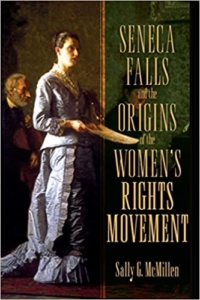 “In the quiet town of Seneca Falls, New York, over the course of two days in July, 1848, a small group of women and men, led by Elizabeth Cady Stanton and Lucretia Mott, held a convention that would launch the women’s rights movement and change the course of history. In Seneca Falls and the Origins of the Women’s Rights Movement, Sally McMillen reveals, for the first time, the full significance of that revolutionary convention and the enormous changes it produced.”
“In the quiet town of Seneca Falls, New York, over the course of two days in July, 1848, a small group of women and men, led by Elizabeth Cady Stanton and Lucretia Mott, held a convention that would launch the women’s rights movement and change the course of history. In Seneca Falls and the Origins of the Women’s Rights Movement, Sally McMillen reveals, for the first time, the full significance of that revolutionary convention and the enormous changes it produced.”
5. Capital Dames, By Cokie Roberts (high school to adults)
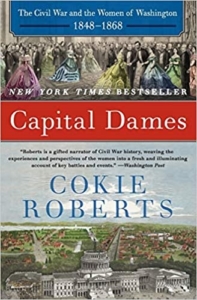 “In this engrossing and informative companion to her New York Times bestsellers Founding Mothers and Ladies of Liberty, Cokie Roberts marks the sesquicentennial of the Civil War by offering a riveting look at Washington, D.C. and the experiences, influence, and contributions of its women during this momentous period of American history.” https://www.amazon.com/Capital-Dames-Civil-Washington-1848-1868/dp/0062002775/ref=pd_lpo_14_t_2/146-3815156-6344263?_encoding=UTF8&pd_rd_i=0062002775&pd_rd_r=136354c4-0c84-46cd-9f1e-a49a8ec02bd4&pd_rd_w=vaMrM&pd_rd_wg=VxzYe&pf_rd_p=7b36d496-f366-4631-94d3-61b87b52511b&pf_rd_r=4TD2SQHNVVKN7FYPMYBF&psc=1&refRID=4TD2SQHNVVKN7FYPMYBF
“In this engrossing and informative companion to her New York Times bestsellers Founding Mothers and Ladies of Liberty, Cokie Roberts marks the sesquicentennial of the Civil War by offering a riveting look at Washington, D.C. and the experiences, influence, and contributions of its women during this momentous period of American history.” https://www.amazon.com/Capital-Dames-Civil-Washington-1848-1868/dp/0062002775/ref=pd_lpo_14_t_2/146-3815156-6344263?_encoding=UTF8&pd_rd_i=0062002775&pd_rd_r=136354c4-0c84-46cd-9f1e-a49a8ec02bd4&pd_rd_w=vaMrM&pd_rd_wg=VxzYe&pf_rd_p=7b36d496-f366-4631-94d3-61b87b52511b&pf_rd_r=4TD2SQHNVVKN7FYPMYBF&psc=1&refRID=4TD2SQHNVVKN7FYPMYBF
6. Ida: A Sword Among Lions: Ida B. Wells and the Campaign Against Lynching, Paula J Giddings (ages high school to adults)
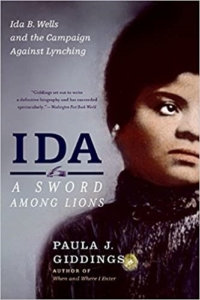 “From a thinker who Maya Angelou has praised for shining “a brilliant light on the lives of women left in the shadow of history,” comes the definitive biography of Ida B. Wells—crusading journalist and pioneer in the fight for women’s suffrage and against segregation and lynchings. Ida B. Wells was born into slavery and raised in the Victorian age yet emerged—through her fierce political battles and progressive thinking—as the first “modern” black women in the nation’s history.”
“From a thinker who Maya Angelou has praised for shining “a brilliant light on the lives of women left in the shadow of history,” comes the definitive biography of Ida B. Wells—crusading journalist and pioneer in the fight for women’s suffrage and against segregation and lynchings. Ida B. Wells was born into slavery and raised in the Victorian age yet emerged—through her fierce political battles and progressive thinking—as the first “modern” black women in the nation’s history.”
7. Edith Wharton, By Hermione Lee (high school to adults)
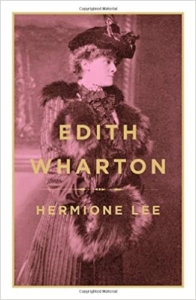 “The definitive biography of one of America’s greatest writers, from the author of the acclaimed masterpiece Virginia Woolf. Delving into heretofore untapped sources, Hermione Lee does away with the image of the snobbish bluestocking and gives us a new Edith Wharton–tough, startlingly modern, as brilliant and complex as her fiction.” https://www.amazon.com/Edith-Wharton-Hermione-Lee/dp/0375400044/ref=tmm_hrd_swatch_0?_encoding=UTF8&qid=1597952138&sr=1-1
“The definitive biography of one of America’s greatest writers, from the author of the acclaimed masterpiece Virginia Woolf. Delving into heretofore untapped sources, Hermione Lee does away with the image of the snobbish bluestocking and gives us a new Edith Wharton–tough, startlingly modern, as brilliant and complex as her fiction.” https://www.amazon.com/Edith-Wharton-Hermione-Lee/dp/0375400044/ref=tmm_hrd_swatch_0?_encoding=UTF8&qid=1597952138&sr=1-1
8. Georgia O’Keeffe, By Tonya Benson (ages high school to adults)
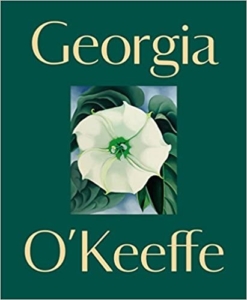 “Georgia O’Keeffe (1887–1986) was one of the foundational figures of American modernism and a pioneering woman in the arts. Widely celebrated and recognized for her flower paintings and Southwest landscapes, O’Keeffe is revealed in full in this new book. With superb plates of more than 200 works, it ranges from well-known masterpieces to the abstractions, nature studies, and New York City scenes…”https://www.amazon.com/dp/1419722743/ref=sr_1_2?crid=2XBV5XHZDGTMQ&dchild=1&keywords=georgia+okeefe+book&qid=1597951281&s=books&sprefix=gerogia+%2Cstripbooks%2C152&sr=1-2
“Georgia O’Keeffe (1887–1986) was one of the foundational figures of American modernism and a pioneering woman in the arts. Widely celebrated and recognized for her flower paintings and Southwest landscapes, O’Keeffe is revealed in full in this new book. With superb plates of more than 200 works, it ranges from well-known masterpieces to the abstractions, nature studies, and New York City scenes…”https://www.amazon.com/dp/1419722743/ref=sr_1_2?crid=2XBV5XHZDGTMQ&dchild=1&keywords=georgia+okeefe+book&qid=1597951281&s=books&sprefix=gerogia+%2Cstripbooks%2C152&sr=1-2
9. Letters of Flannery O’Connor: The Habit of Being: (high school to adults)
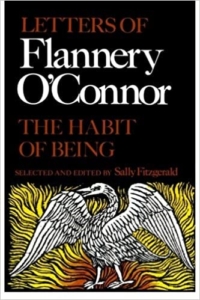 “I have come to think that the true likeness of Flannery O’Connor will be painted by herself, a self-portrait in words, to be found in her letters . . . There she stands, a phoenix risen from her own words: calm, slow, funny, courteous, both modest and very sure of herself, intense, sharply penetrating, devout but never pietistic, downright, occasionally fierce, and honest in a way that restores honor to the word.”?Sally Fitzgerald, from the Introduction
“I have come to think that the true likeness of Flannery O’Connor will be painted by herself, a self-portrait in words, to be found in her letters . . . There she stands, a phoenix risen from her own words: calm, slow, funny, courteous, both modest and very sure of herself, intense, sharply penetrating, devout but never pietistic, downright, occasionally fierce, and honest in a way that restores honor to the word.”?Sally Fitzgerald, from the Introduction
10. There Is No Alternative: Why Margaret Thatcher Matters, By Claire Berlinski (high school to adults)
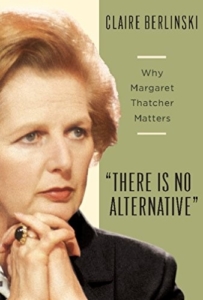 “Great Britain in the 1970s appeared to be in terminal decline — ungovernable, an economic train wreck, and rapidly headed for global irrelevance. Three decades later, it is the richest and most influential country in Europe, and Margaret Thatcher is the reason… Ultimately, however, Claire Berlinski agrees with Thatcher: There was no alternative. Berlinski explains what Thatcher did, why it matters, and how she got away with it in this vivid and immensely readable portrait of one of the towering figures of the twentieth century.”
“Great Britain in the 1970s appeared to be in terminal decline — ungovernable, an economic train wreck, and rapidly headed for global irrelevance. Three decades later, it is the richest and most influential country in Europe, and Margaret Thatcher is the reason… Ultimately, however, Claire Berlinski agrees with Thatcher: There was no alternative. Berlinski explains what Thatcher did, why it matters, and how she got away with it in this vivid and immensely readable portrait of one of the towering figures of the twentieth century.”
Get Updates on Our Education Research
Browse related content

